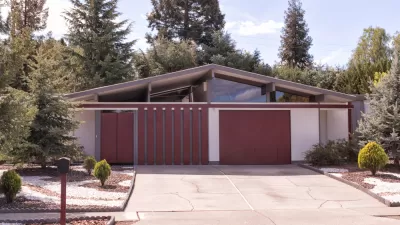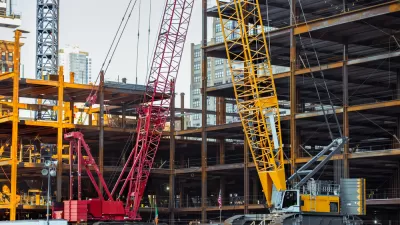City council members of Burlingame, a small, affluent suburb south of San Francisco, are not happy with new laws that take away their discretion to reject developments that fail to meet "neighborhood character" criteria, but meet zoning requirements.
At their meeting on Dec. 4, the "Burlingame City Council critiqued the most recent batch of laws signed by the governor designed to combat the state housing crisis," reports Austin Walsh for The (San Mateo County) Daily Journal on Dec. 7.
While acknowledging the intent of the policies designed to address affordability through loosened development regulations, councilmembers suggested the implementation may be inappropriate for Burlingame.
As one would expect, it was the streamlining, "by-right" housing bill, SB-35 by Sen. Scott Wiener (D-San Francisco) that irritated council members and one member of the public, "as the legislation strips the currently held rights of local administrative bodies to hold up construction of proposals meeting a certain, albeit narrow, criteria," writes Walsh.
The law pertaining to multi-residential developments with at least 10 percent of affordable units proposed in an appropriately zoned area on a site which has not served as tenant housing in the last decade would only be subject to objective review by planning commissions.
Such standards would greatly reduce the rights of commissioners to delay or deny certain proposals on the grounds of project designs being deemed incompatible with surrounding neighborhood character.
However, "preserving neighborhood character" can mask an anti-growth, anti-density, and even segregationist approach to zoning, as noted by Conor Dougherty, economics reporter at The New York Times, on July 3, 2016:
Studies have shown that laws aimed at things like “maintaining neighborhood character” or limiting how many unrelated people can live together in the same house contribute to racial segregation and deeper class disparities. They also exacerbate inequality by restricting the housing supply in places where demand is greatest.
And density was a key concern of council members, adds Walsh. "Beyond the architectural impact, SB 35 would also disallow local officials from denying a proposal due to concerns it would be too dense for its surrounding community."
SB 35 addresses those discretionary abilities used by city councils to reject housing in cities that fail to meet their housing requirements. The purpose of "by-right" housing is "to streamline local approval of residential projects that are compliant with local zoning and affordable housing requirements in urban areas," wrote Sonja Trauss and Kate Vershov Downing in this Mercury News commentary last year on the unsuccessful predecessor to Wiener's bill.
A key aspect of the law that the Burlingame City Council may not have recognized is that the streamlined housing approval process only applies to "cities that are not meeting their housing goals required by the Regional Housing Needs Assessment (RHNA)," according to Wiener's office. "This streamlining will expedite the construction of critically needed housing."
Council members also took issue with SB 166 by Sen. Nancy Skinner (D-Oakland)
Under Senate Bill 166, officials must justify the rationale for allowing developments diverting from the state’s consideration of each site’s highest and best use, which favors construction of dense and affordable housing.
According to Skinner's office, the law "strengthens the No Net Loss zoning law by requiring local governments to immediately identify a replacement site if a project that differs from the housing category originally designated is approved. Additionally, SB 166 requires that the replacement site must meet the specific housing affordability level that was lost."
FULL STORY: New housing laws roil officials in Burlingame

Maui's Vacation Rental Debate Turns Ugly
Verbal attacks, misinformation campaigns and fistfights plague a high-stakes debate to convert thousands of vacation rentals into long-term housing.

Planetizen Federal Action Tracker
A weekly monitor of how Trump’s orders and actions are impacting planners and planning in America.

San Francisco Suspends Traffic Calming Amidst Record Deaths
Citing “a challenging fiscal landscape,” the city will cease the program on the heels of 42 traffic deaths, including 24 pedestrians.

Defunct Pittsburgh Power Plant to Become Residential Tower
A decommissioned steam heat plant will be redeveloped into almost 100 affordable housing units.

Trump Prompts Restructuring of Transportation Research Board in “Unprecedented Overreach”
The TRB has eliminated more than half of its committees including those focused on climate, equity, and cities.

Amtrak Rolls Out New Orleans to Alabama “Mardi Gras” Train
The new service will operate morning and evening departures between Mobile and New Orleans.
Urban Design for Planners 1: Software Tools
This six-course series explores essential urban design concepts using open source software and equips planners with the tools they need to participate fully in the urban design process.
Planning for Universal Design
Learn the tools for implementing Universal Design in planning regulations.
Heyer Gruel & Associates PA
JM Goldson LLC
Custer County Colorado
City of Camden Redevelopment Agency
City of Astoria
Transportation Research & Education Center (TREC) at Portland State University
Jefferson Parish Government
Camden Redevelopment Agency
City of Claremont





























